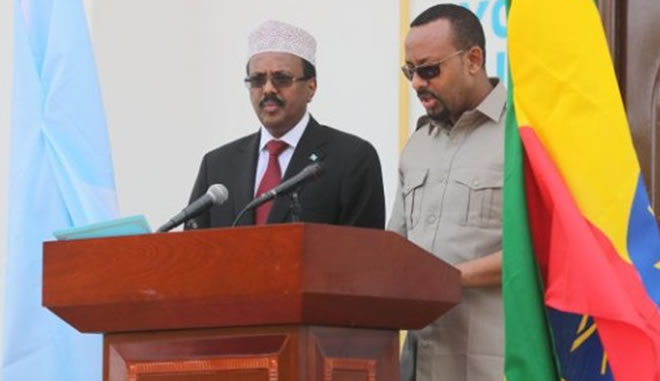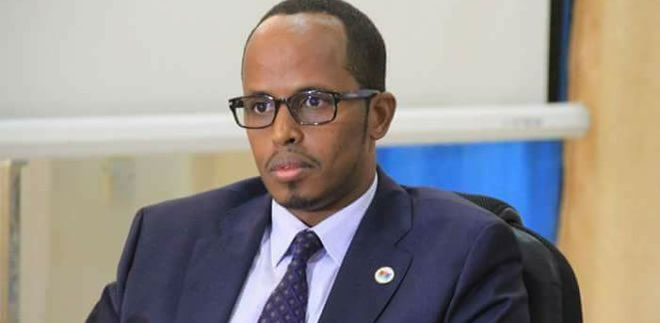How Not to Engage With Ethiopia
By Heikal Kenneded
Wednesday, June 27, 2018

The new Ethiopian Prime Minister Abiy Ahmed’s recent visit in Mogadishu marked unlikely shift in the two countries’ relations. In a joint communique statement issued by both President Farmajo and Prime Minister Ahmed have agreed to "strengthen their brotherly bilateral relations" and abolish trade barriers between the two countries, including investment of four major Somali ports. This unprecedented bilateral negotiations between the two neighboring countries has received mixed reviews that most Somalis could only sense the sinister side of Ethiopia investing in Somali ports, which it doesn’t have the financial capital to do so and could only be interpreted as a maritime encroachment rather than economic investment. More fundamentally, it’s hard to see Ethiopia entering fair bilateral trade agreement with Somalia on equal grounds due to its historical aggressions and political meddling within Somalia. Given the fragility of the federal government Somali and the prevaili.ng political fragmentation within its regional states, it should not rush into entering bilateral agreements with any predatory nations and companies. No matter how friendly Ethiopia suddenly appears to be, any bilateral trade negotiation talks should be held off, scrutinized and publicly debated for due process.
Unfortunately, President Farmajo conveniently forgets (or he is ignorant of the new prime minister’s background) that Mr. Abiy Ahmed, as a former intelligence officer, is none but a protégé of the late cunning Ethiopian Prime Minister, Meles Zenawi who sent up to 10,000 troops into Somalia to commit unprecedented genocide that has driven close to a million of Somalis from their homes, not to mention laying the grounds of the current political undermining in the federal regional states. If President Farmajo seems to believe the century-old Ethiopian animosity towards Somalia would be overturned by a few hours’ visit of PM Abiy Ahmed in Mogadishu and chooses to fall for his gambit, he’s politically naïve, dangerously naïve.
The harsh truth is that the United Arab Emirates is behind Ethiopia’s current push to invest in these unnamed four major Somali ports by promising them to loan the funds to invest in these ports. This only comes after the UAE’s Crown Prince, Sheikh Mohammed bin Zayed recently visited Ethiopia, where he pledged to give Ethiopia $3 billion in aid and investments, which follows on the heels of the recent resolution banning the UAE state-owned DP World from working in Somalia by both the Upper and Lower Houses of the Parliament. Since DP World openly violated the independence and unity of Somalia, but this has done little to deter its destructiveness in the Horn of Africa and is bent up now to use Ethiopia as its Trojan horse to “take hostage” all major Somali ports for the next thirty years so that they do not compete with its ports. In other words, it is most Somalis’ firm belief there is a tacit Arab Gulf States policy to keep Somalia destabilized and penurious and they have found in Ethiopia a reliable proxy to achieve their subverting objectives.
Despite Mr. Abiy Ahmed appears to be a political reformist, he is caught up in a trap of his predecessors’ making whose policies towards Somalia were merely based on divide and conquer that has damaged Somalia’s stability for the last quarter of century. Since the majority in the ruling Ethiopian People’s Revolutionary Democratic Front (EPRDF), which has ruled the country despotically for the past 27 years are bent on keeping Somalia as a divided and weak nation state that takes its marching orders from Addis Ababa. No wonder, Abiy Ahmed's Speech soon after his return from Somalia created so much controversy by declaring the impending unity of the two nations. For the moment, it would be wise for the new Prime Minister of Ethiopia to move cautiously with his dealings of Somalia because there’s a huge confidence building measures that are needed to be established before the two nations could move towards economic bilateral relations. While perhaps it is strategically satisfying to normalize relations with a country that has undermined Somalia’s integrity and political stability for the past 25 years, and thus rushing to economic investment approach is unlikely to work. In reality, Ethiopia has greater leverage over Somalia than many imagine that could have irreprehensible consequences for the long future by allowing them to take over major strategic ports in the country.
Despite Mr. Abiy Ahmed appears to be a political reformist, he is caught up in a trap of his predecessors’ making whose policies towards Somalia were merely based on divide and conquer that has damaged Somalia’s stability for the last quarter of century. Since the majority in the ruling Ethiopian People’s Revolutionary Democratic Front (EPRDF), which has ruled the country despotically for the past 27 years are bent on keeping Somalia as a divided and weak nation state that takes its marching orders from Addis Ababa. No wonder, Abiy Ahmed's Speech soon after his return from Somalia created so much controversy by declaring the impending unity of the two nations. For the moment, it would be wise for the new Prime Minister of Ethiopia to move cautiously with his dealings of Somalia because there’s a huge confidence building measures that are needed to be established before the two nations could move towards economic bilateral relations. While perhaps it is strategically satisfying to normalize relations with a country that has undermined Somalia’s integrity and political stability for the past 25 years, and thus rushing to economic investment approach is unlikely to work. In reality, Ethiopia has greater leverage over Somalia than many imagine that could have irreprehensible consequences for the long future by allowing them to take over major strategic ports in the country.
In its efforts of Somalia trying to rise from years of violence and political instability, it’s very susceptible of being taken on a ride by various predatory nations and companies and the current leadership needs to be very cautious the true intentions of getting into any economic negotiations. The fact that Ethiopian troops have currently an immense presence in most regional states of Somalia that fact itself renders them in conflict of interest to such investments. As such, before Ethiopia considers cultivating any sort of economic bilateral relations with Somalia, there must be preceded other trust-building negotiations that erase fear and apprehension between the two societies, which have occupied their political minds for the longest time. In other words, Somalia is currently is too unstable and fragmented to enter an equal bilateral negotiations with its neighboring hegemony - Ethiopia.
To most Ethiopians, Somalis’ existential fears are exaggerated, blown up by the media to scare the people point out that Ethiopia has never been the aggressor. Even when Ethiopia invaded in southern Somalia, in 1996, it only did so to avert the danger that Islamic jihadist taking over Somalia represented to them. Instead, Ethiopians claim Somalis’ own divisive tribalism is the root of their instability, which is partly true. Nevertheless, most Somalis cannot shake off the reality of how Ethiopia represented to them an arch enemy of an existential threat for over a century. In any event, Ethiopia’s population and its economy are now both ten times bigger than Somalia’s and growing faster than most of African nations. Whereas Somalia relies on aid and begs foreigners to rebuild its army and economy, Ethiopia, by contrast, races on and it is now ready to flex its muscles throughout the Horn of Africa, not to mention that it has finally the UAE eager to be its friend in collusion to destabilize the Horn of Africa, especially Somalia. Further, Somalia’s major insecurities have been intensified over the years by natural disasters of drought, flooding, and starvation, which are all the more deeply felt because the government lacks the necessary financial capital to lift its people from these multifaceted natural and man-made catastrophes. Ethiopia therefore desires influence in Somalia for the sake of “strategic depth,” which means having control over its territory and coastline in order to legitimately flex its economic muscles in the Horn. Either way, Ethiopia wants Somalia to remain in the status quo of being weak and divided, but find a way to exploit its natural resources and coastlines.
Despite the many competing foreign policy demands for the Farmajo administration notwithstanding must not make a normalized Ethiopia-Somalia relationship as a top foreign policy priority. No other issue risks causing as much damage to the country’s credibility as its effective leader, as the prospect of Ethiopia-Somalia trade negotiations without any concrete . In the end, perhaps good economic relationships with Ethiopia might come one day, however, at the moment the best approach would be to wait and see how Prime Minister Abiy Ahmed’s approach and dealings with Somalia on equal ground might be quite different from his predecessors, at the highest levels and without equivocation that the only way to preserve any relationship with Ethiopia is to amend all past territorial and political transgressions before entering into any consequential economic negotiations. President Farmajo with his flexible policy and willingness to accept all Ethiopian false offerings could plausibly deliver his downfall.
Heikal Kenneded
heikalk@yahoo.com
Washington D.C.


